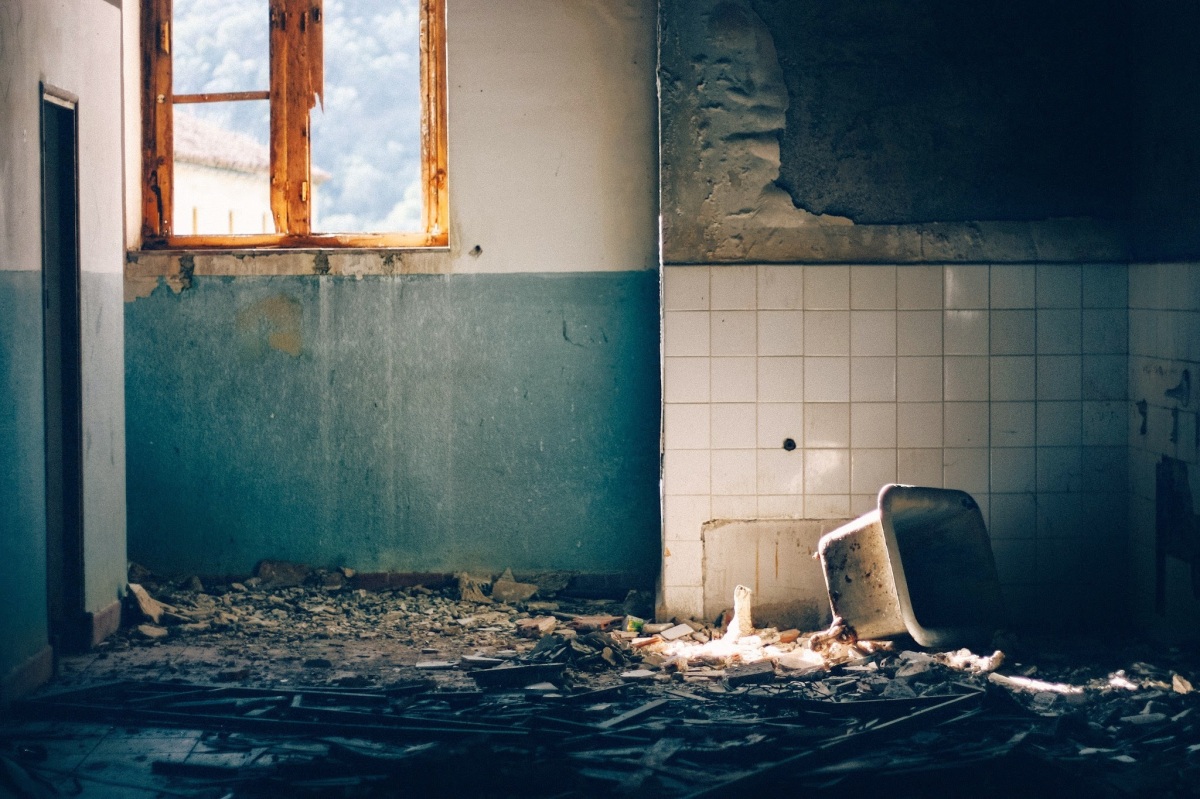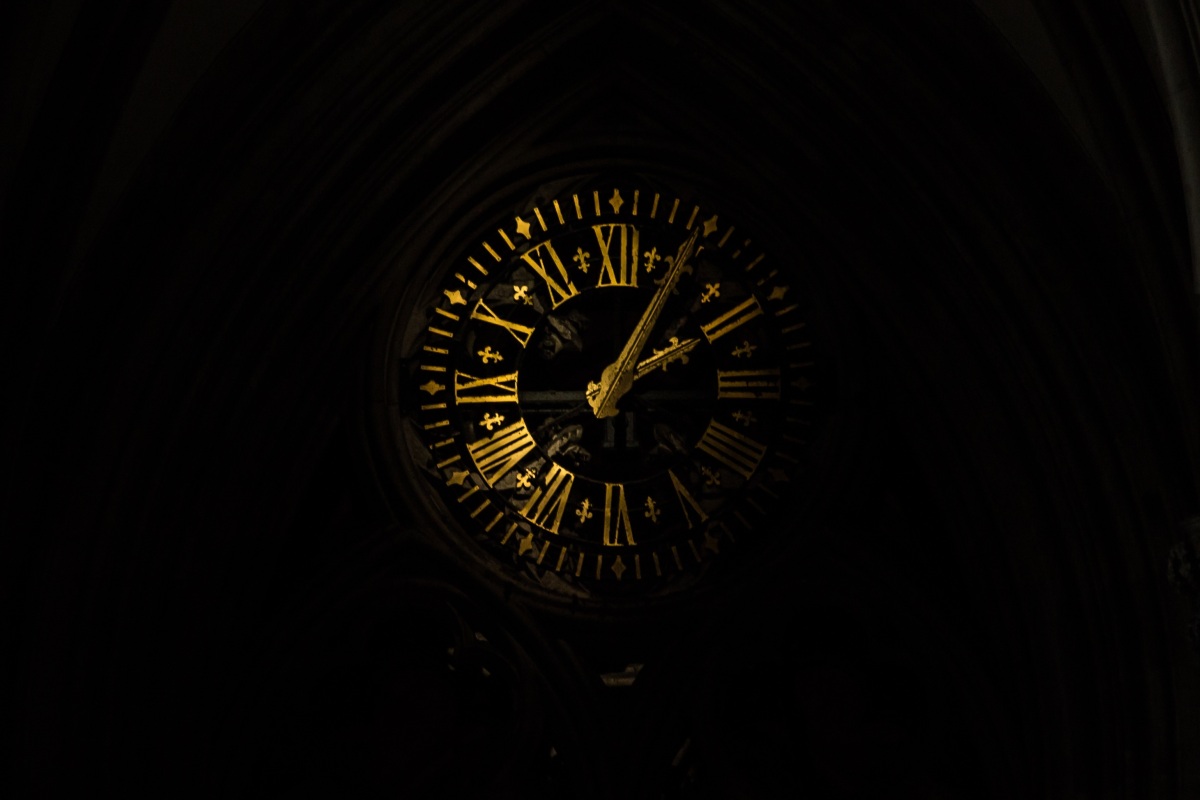Sequel to Blank, though it can be read independently. It has its own sequel, Five Finger Discount: A (Pre) Halloween Tale, though it too can be read independently.
~
Eleven at night, and it was still hotter than hell.
Dublin wasn’t a city known for scorching heat waves, but the last week had broken all records. It had topped out at thirty-six degrees that day, and even the wind off the sea hadn’t been enough to dispel it. Its inhabitants weren’t built to handle such heat: they’d crowded into any shop that had air conditioning, or sat panting in whatever shade they could find. Almost every shop in the city had run out of bagged ice two days ago, and there wasn’t an electric fan to be had.
Lorna and the rest of the crew had spent the day splashing around in the River Liffey, deepening their already terrible sunburns. The warehouse they called home might as well have been a sauna, and no public bath would have dreamt of admitting the lot of them. The gang currently consisted of fourteen people, ranging in age from thirteen to twenty, dirty and disreputable but largely harmless. Calling them a ‘gang’ was a bit harsh, really; they were a collection of runaways, either orphans who’d fled foster care or kids like herself, who’d jumped ship from biological family not worth knowing. Every so often Social Services would make a halfhearted attempt to collect them, but it never stuck, and few wanted to deal with a pack of repeat juvenile offenders.
They’d trouped back home at dark, sopping wet and hungry. ‘Home’ was, at the moment, an abandoned warehouse that they shared with an older, rather more serious gang, for whom they ran occasional errands in exchange for a little spare cash. It was a symbiotic relationship: their housemates kept the truly dangerous criminals away, and in return they did all sorts of minor smuggling.
The warehouse was empty when they got there, and still sweltering. The ancient, wheezing icebox had both sandwiches and beer, though, and they clambered out onto the roof to eat and watch the sunset. A haze of bitter dust rendered it almost hellish, tinting everything beneath it in shades of sepia and shadow. To Lorna it looked like the dying of some great red eye — an effect helped along by the half-joint she’d just finished. It never did take much to addle her head; at fourteen, she stood only four foot ten, and weighed about ninety pounds on a good week. She looked so much younger than her actual age that she was the favorite drug-mule out of the entire crew. It also meant a single beer could get her completely and utterly plastered.
She’d sat quiet a long while, cross-legged on rough shingles that continued to radiate heat long after the sun had dipped below the horizon. It was still so hot in the warehouse that sleep wasn’t to be thought of for some hours yet, and her sunburn had started to itch like a mad bastard.
“I’m bored,” she said eventually, cracking her bare toes. The light pollution of the city kept the night sky from looking like anything special, and she wasn’t a creature who could sit idle for long.
“Christ help us,” Orla muttered. She was a few years older than Lorna, tall and a bit mannish, and her shock of sun-bleached hair only made her face look even redder. “You’re so off your face I doubt you can even walk. I’ll not fish you out’v the river if you fall in again.”
Lorna scowled, but managed to stand on her second try, and even succeeded in walking in a more or less straight line. “Then don’t come with me.” Inspiration struck as her balance fought to reorient itself. “I’m after a bus.”
“A bus?” That was Shane, the gang’s leader, looking at her thoughtfully. At twenty he was the oldest of them — taller than Orla, covered in home-done tattoos, with a mane of brown hair that hadn’t seen a pair of shears in all the time she’d known him.
“A bus,” she repeated, shoving the hair out of her eyes. It was mostly dry by now, and incredibly tangled. “They’ll all be back in the yard by now, and I want one.”
“You want to nick a city bus?” Orla asked. “Why?”
“Why not? Have you got anything else to be doing tonight?”
“I haven’t,” she admitted. “But Lorna, that’s mental. You’re mental.”
“You say that like it’s news,” Shane muttered, and Lorna shot him a scowl. “I’ll go, if only to stop you driving into a light-pole.”
“Not like her feet’d reach the pedals anyway,” somebody else snickered — it had to be Maureen, the little shit. “If Shane’s going, I’m going.”
“Me, too,” Kevin piped in. He wasn’t much taller than Lorna herself, and she didn’t know how old he was — nobody knew much at all about Kevin, except maybe Shane. He was a quiet one, who didn’t often speak unless he thought it absolutely necessary, and he occasionally had violent seizures — epilepsy, Shane said, and nothing any of them could do would induce him to see a doctor. They didn’t happen often, but when they did he was sick and silent for days afterward. He wiped his hands on his damp, manky jeans, and stood.
It went all around like that, until eventually Orla gave in as well. “If I wind up in gaol because’v this, I’ll shave your head,” she threatened. It was her standard threat, one she’d never tried to make good on — mostly because the last person who had gone after Lorna’s hair had nearly lost a finger.
“Let’s do this,” Lorna grinned, and somehow made it down the fire escape without falling and breaking her neck. The pavement was gritty under her bare feet, even now faintly warm, and she cast an automatic glance around at the shadowy forecourt. Their housemates weren’t back yet; the entire place was empty, but she felt watched.
Lay off the weed, she thought. It wasn’t an unpleasant sensation, but it was…wrong. Alien. Nights like this, when everything around here was so deserted, she always half expected to see a pack of zombies lurching out of the darkness. She’d snuck into the cinema four times to watch Day of the Dead, despite — or perhaps because of — the nightmares it gave her. She’d actually made plans with Shane, just in case they really did wind up in the middle of a zombie apocalypse.
No, this wasn’t scary like that, but it was…strange. She couldn’t write it off on her current state, though she’d like to. There — there in the shadows — what was it? It was too big to be a cat, the wrong shape to be a person, and it remained even once she’d blinked, lurking against the wall of the warehouse opposite.
It wasn’t something she could bring up to the others. She’d had some fantastically bad reactions to drugs before, and if Shane thought she was going off her head, he wouldn’t let her go anywhere. He could be worse than ever her mam had been, when Mam had still been alive.
So she kept quiet, and none of the others seemed to notice anything out of the ordinary. They laughed and grumbled and occasionally belched as food and Guinness formed their lethal, gassy combination. Only once did she glance back as they made their way to the street — but the thing was still there.
“Don’t watch it.”
To her surprise, that was Kevin, who had fallen back beside her. His hands were stuffed in his pockets, his posture slouched, but there was tension in his thin shoulders. His hazel eyes were bright in the glow of the streetlamp, bright and unnerving. “I mean it. Don’t. Bad enough you’ve seen it once already.”
She blinked at him, confused. “I haven’t,” she said, almost whispering. “What is it?”
“A bad sign,” was all he would say. “It’s a good thing we’re out for a bit. Someone’s for it tonight.”
Well, that wasn’t half baffling. Kevin made her nervous at times, and she normally didn’t know the meaning of the word. He refused to say anything more, and eventually she gave up and migrated to one side of the herd.
The street was dead empty this late, and their footfalls and laughter echoed loud in the quiet of the night. There wasn’t even a hint of a breeze — damn rare for Dublin at any time, and that too made her nervous.
Fuck it, she thought, shoving it relentlessly out of her mind as they approached the bus yard.
All of Dublin’s buses came from this single spot, lined up in neat rows behind a chain-link fence topped with concertina wire. The lock was a heavy Yale bastard that held a short, heavy length of chain together around the door, but it did no good when bolt-cutters took care of the fence itself so very easily. Shane carried a miniature pair wherever he went, on an old, tarnished brass key-ring along with all sorts of other bits of metal not strictly legal.
One by one they crawled through the hole he cut, stage-whispering and laughing. As Lorna had expected, once she’d got them going they all bought into the spirit of the thing; they usually did, sooner or later, even if it was often against what passed for their better judgment. She wasn’t the only one who’d been drinking, after all, and she’d smoked a lot less grass than most of them. It hit her faster, but it was all but guaranteed it would hit them harder eventually.
“Pick a bus, any bus,” Shane said, and she scrutinized them closely, as if there were any actual difference.
“That one,” she said eventually, and held out her hand for Shane’s larceny-ring. He’d taught all of them how to pick locks, and since this was her idea, she was the one who’d be leaving the fingerprints. It took more jimmying than it should have, simply because there was too much alcohol in her system for her hands to work properly, but eventually they all wound up in the big, slightly smelly vehicle.
It took her nearly twenty minutes to figure out how to hot-wire the damn thing. That was yet another skill Shane had taught them, but a city bus was rather different than a car. She zapped herself several times, and set the headlamps flickering on and off for a good five minutes before she actually got the thing started.
“How the hell d’you plan on getting this beast out’v here?” Maureen demanded, while Lorna fumbled with the seat. True to her irritating mate’s prediction, she could scarcely see over the dash if she stretched enough to make her feet reach the pedals, but she wasn’t about to let on.
“Easy,” she said, fumbling with the gearshift. In theory she could drive a manual, but once again, a manual and a bus weren’t the same thing. She wasn’t about to give over on the whole idea, though — Maureen would never let her live it down. And she especially didn’t want to go back to the warehouse just yet. “Watch.”
The bus shuddered like an epileptic drunk, and she nearly crashed into the one opposite while trying to turn. The wheel was so big she couldn’t reach the far side of it, and it took a few mad course-corrections before she got her aim.
“You’re not—” Maureen started, but before she could finish the sentence, Lorna had gunned the accelerator and rammed right through the fence. It came apart with a tearing shriek of metal, odd bits scratching along the sides with the teeth-grating sound of nails down a chalkboard. Half the crew cried out in horror; the other half cheered.
“Well, now we’re bloody well screwed,” Orla said, but she was laughing — yep, the weed had kicked in for her too, finally. “And where d’you plan on going with this thing?”
“Let’s hit the south M7,” Lorna grinned. “Bet this thing’s never been on a real road trip before.”
“And what’ll we do when the cops catch us?” Maureen asked, with withering sarcasm.
“Outrun them,” Lorna said, as though it were obvious. “Pity it’s not America; we could get in a shoot-out.” The Guarda didn’t carry guns, and the mental picture of them whacking at a bus with their truncheons made her laugh so hard she almost ran off the road.
“Hit the radio, will you?” Orla said, slipping sideways on her seat and almost falling out of it.
“Have buses got radios?” somebody else asked — Mick, from the sound of it, though he was so plastered he was barely intelligible.
“This one has.” Lorna fumbled with the dial, and caught some screeching English metal band. She cranked the volume as high as it would go as they pulled out onto the motorway.
They had it to themselves at this time of night, and she gunned the accelerator as fast as she could, occasionally swerving as the big vehicle fought her control. Underneath her slightly drunken exultation was a faint sense of relief — whatever she’d seen near the warehouse was dropping ever farther behind them. She didn’t even know what it was, but her every instinct told her it was a thing you’d do best to outrun. Even now her shoulder blades itched, and not just from her sunburn.
She caught sight of Kevin in the rear-view mirror. He must be as relieved as she was, but he didn’t show it; he rarely showed anything that might be going on in his brain. Some of the others thought him weird in the head, but they thought that of her, too. Aside from Shane, he was the only one who went in much for reading: he could probably have qualified for his Leaving Certificate already if he’d stayed in school.
Like her, he’d fled an abusive household, but she thought it was a damn shame he’d wound up having to stay with them. She was perfectly happy with her life, but Kevin could do so much more, if he’d be given the chance. Like Shane, Lorna was far more observant than she let on, and she hoped he’d get his chance. He wasn’t cut out for this life, and it had only been bad luck he’d been born into the situation he’d left behind.
The bus fought her again, and she turned her attention, such as it was, back to the road. She never felt more alive than she did while doing something completely idiotic, and this was one of the stupidest things she’d come up with in a long while. She had no idea where they’d ditch the bus, nor how they were to get home, but she didn’t care and it seemed nobody else did, either. They were all masters of living in the present; if you weren’t, with the kind of life they led, you’d go mad. Planning for the future wasn’t a good idea when you slept rough in a warehouse every night. You had to take things as they came, deal with what was immediately in front of you.
The highway flew by, the rumble of the big diesel engine mingling with the music. Christ, they’d about left Dublin now; she had to get off the motorway soon, or they’d wind up in bloody Kildare. And she didn’t want to leave the bus where it would be found so easily.
They were coming up on a bridge over the Liffey when she made the mistake of glancing in the rearview mirror again, and what she saw made her lose all grip on the wheel.
It wasn’t just her laughing gang back there now. Somehow they’d acquired another passenger — a dark passenger, a figure little more than a shadow that barely showed up in the darkness of the interior. Though she could see no eyes, she could feel them, watching her with an intensity that twisted her gut. There was nothing malevolent in them, nothing evil, but they definitely weren’t the eyes of anything human.
And this time, she wasn’t the only one that saw it. Maureen let out an ungodly shriek, scrambling toward the front of the bus, and then every last bloody one of the others joined in, panic sobering them up more effectively than a bucket of cold water. It was no wonder she lost control of the wheel entirely then, and the bus lurched, swerved, and plowed straight into the guardrail at the side of the bridge.
Metal screeched on metal as the rail tried valiantly to do its job, but it had been built for cars, not something as heavy and ungainly as a city bus. They crashed right through it, and for a gut-churning instant they were airborne. More than an instant; it felt like a small eternity before the thing nosedived into the river, and the panic became outright hysteria.
They all made a mad scramble for the emergency door at the back, tripping over the seats and one another as the bus swiftly became a vertical obstacle-course. Shane made a fumbling grab for the emergency lever — which proved to be a massive tactical error. Water surged in, knocking half of them backward, but they were still near enough to the surface that they broke free of the suction — even Lorna, who could barely so much as dog-paddle.
She broke the surface spluttering, and did a frantic head-count. She couldn’t tell if they were all there, but the thing that had been with them wasn’t. The best swimmers struck out for the shore, but the Liffey’s currents were strong here, and even they were having a hard time of it. Lorna would have gone under entirely if it weren’t for Shane, who grabbed her long, tangled hair and dragged her after him. Between the chill of the water and the adrenaline in her system she barely registered the pain, and did what she could to keep up with him before he could tear all her hair out by the roots.
She coughed and wheezed when she found the rocky bank beneath her hands, and tried to clear the water from her eyes enough to see just what the hell was going on. Nearly all of them had made it out by now, on one side of the river or the other, too shocked to comprehend what had just happened. Lorna definitely wasn’t hot now; the water had chilled her to the bone, and she would probably have stayed rooted to the spot if Shane hadn’t got hold of her hand and literally pulled her up the bank. It was steep here, hard going, but eventually they reached the motorway and its wrecked guardrail.
The pavement there was warm, at least, heating up the soles of her feet, and she continued to cough up what felt like half the river. As soon as she’d got it all up she started wringing out her hair on auto-pilot, her brain still refusing to comprehend… anything, really. Those who had climbed the other bank ran toward them, looking more like terrified children than fearless, happy-go-lucky teenagers.
“Did you see that?” Maureen managed, right before puking up everything that had been in her stomach. The sight made Lorna lose what was left of her dinner, too, and she grimaced at the bile that burned her throat. “What in mother fuck was it?”
“I don’t know, and I don’t want to.” Even under her sunburn Orla had gone nearly as pale as her hair, her eyes wide and wild. “I about shat myself down there.”
It wasn’t funny, but they laughed anyway, mostly because it was laugh or go completely barking mad. In a way it was almost a relief to find they’d all seen it, though it also meant none of them could write it off as a drug-induced hallucination. Lorna wondered if it was selfish, to be glad the others shared her shock, and decided it wasn’t: she couldn’t imagine any of them would be sorry they weren’t bearing it alone.
“It missed.”
The words were a whisper very near Lorna’s ear, and she jumped. Somehow Kevin had all but materialized beside her. He was speaking only to her, with an urgency that frightened her even more than the crash. “I thought it was after somebody at the warehouse, but I was wrong.”
“What in flippin’ hell are you talking about?” she demanded, just as quietly.
He looked at her very strangely, shoving water-darkened hair back from his forehead. “Death,” he said, as though it ought to have been obvious. “You watched your mam die in the hospital, Lorna. You had to’ve seen it then.”
She hadn’t. That… that thing was hardly something a person could forget, even after doing as many drugs as she had. Yes, she’d watched Mam die — her and her brothers and sister had been crowded around their mother’s bed, too stunned to comprehend that Da had finally hit her too hard. He’d been gone in gaol by then, the four of them wards of the state, and so far as she knew not a one of them had seen anything strange. She hadn’t seen any of them in years: her sister had stayed in her foster-home even after Da got released, her eldest brother was in gaol himself, and nobody knew where John had got to. She could hardly ask any of them now.
“I didn’t,” she insisted. “When would you have?”
“The accident that killed my father,” he said. “I saw it come for him. It was after one’v us tonight, and I haven’t got a clue in hell why we’re all still here. You watch them, Lorna,” he said, low and fierce. “They’ll forget. They’ll all forget, by the time we get home. Not a one’v them will know how any’ve it happened. They might not even remember crashing.”
“Why?” she whispered. “How could you know that?”
“I’ve seen it happen before,” he said, and now there was a desolation in his tone she’d never heard from anyone, ever.
“Then how d’you know I’ll remember?”
Again there was a strangeness in his eyes, a distance she didn’t like at all, as though he were looking into some private hell. “You’re marked, Lorna Donovan,” he said. “Right here.”
He touched her forehead, and she recoiled. She wanted to call him daft, say he’d had one too many before they left, but in the very bedrock of her soul she knew better. They’d all known for a long while now that Kevin was… different, but she’d never let herself wonder why, or how.
“Get off it,” she croaked, hardly aware of what left her mouth. “I’m not gonna die.”
“No,” he said, looking at her with an intense, almost bewildered curiosity, “you’re not. Not yet, and I don’t know why that is. You should have, right here.” He paused, more faraway than ever. “Maybe it didn’t miss,” he murmured. “Maybe it let you go.”
She shuddered, and fought an urge to sick up again. She didn’t want to believe it, any of it, but her beleaguered mind refused to deny his bizarre pronouncement.
“A storm’s coming for you, Lorna,” he said. “Not for a long time yet, but it is. It’s coming for all’ve us, but it’ll hit you first.”
“You’re off your nut,” she said uneasily. “How in bloody fuck would you know any’ve that?”
He was quiet a long, long time, ignoring all the others, who were too busy swearing to notice either of them. “Dunno if I should tell you this,” he said. “I guess I ought to, given what’ll come. Those seizures’v mine… I see things. Things about all’ve us, but you… you’ve eighteen years before everything goes to hell for you. Be careful.”
She stared at him, no longer aware of the chill in her limbs. If he’d been talking about Shane she might have believed it, but she wasn’t like either of them. There was nothing special about her, nothing to distinguish her from the hundreds of other homeless people that roamed the city. Like many, she was just a short kid who drank more than was healthy, who did stupidly lunatic things just because she could — no, he had to be wrong.
Lorna was nothing, and she was perfectly happy being nothing, glad for the utter anonymity of her life. She did as she pleased, with no grown-up to yap at her about grades or clothes or the company she kept, nobody to demand she try to be anything special. That anonymity and ordinariness was something she thrived on, and she couldn’t imagine anyone or anything caring enough to bother sending her life to hell. She was a quintessential background-dweller, for fuck’s sake, the kind of kid nobody looked twice at, and she liked it that way.
“If you can see so much, how do I dodge it?” she asked, wishing she didn’t feel compelled to humor him, to rise to that insane statement.
“You can’t,” he said, and he looked more desolate than ever. “None of us can. What’s coming is something nobody on the planet can escape.”
Christ, wasn’t that an even worse idea. Where did he come up with this shite? Could epilepsy make someone hallucinate? She had no idea, but it was an easier thought to live with than actually believing him. “Come on,” she said. “We’ve a fuck’ve a long walk ahead’ve us.”
She turned and moved away before he could say anything, walking a little ahead of the group and trying not to think. Maybe she’d stay quiet a while after this, stick to the warehouse so no one had cause to notice her, but some fundamental instinct warned her that wouldn’t work. It believed Kevin, even if what rational mind she had refused to.
He’s barking, she told herself. He has to be.
But in one thing, at least, he was very right. Even with the group a ways behind her, she could feel the easing of their tension, the wane of what was extremely understandable terror. When she dared look behind her she could see they were still shaken up, but some of them were laughing, telling one another they’d have a grand story for their housemates.
“Least we don’t have to worry about anyone finding fingerprints,” Orla said, grinning and shaking out her wet hair. The warm night air was already drying it, and errant wisps floated around her head like a pale corona. “Might take them ages to even dredge the thing up.”
“Dunno what in fuck Lorna could’ve hit,” Mick slurred, weaving along in the weirdly graceful almost-dance of the extremely drunk.
“Probably nothing,” Maureen muttered. “Knew she wouldn’t be able to see what she was doing. Lucky none’v us copped it back there.”
A sharp glance at Kevin made Lorna shiver. He wasn’t surprised, not at all, and his hazel eyes looked incredibly old in his young face. It disturbed her beyond words, and she looked away, concentrating only on putting one bare foot in front of the other. Her mind deliberately tuned itself out as she trudged, shutting it down the only defense she had. When they got back, she was going to drink herself stupid for the rest of the week.
Pale dawn was tinting the eastern horizon by the time they got home, the air already heating up again. The day would be another scorcher, but she had no desire to go swimming again. Hell, she’d gladly avoid rivers for the rest of her life, after that.
When she staggered through the door she found their housemates asleep — or passed out — all over their half of the warehouse. She grabbed a beer from the icebox and downed it in three large gulps, letting the alcoholic buzz dampen what few coherent thoughts remained to her. She got halfway through another before she passed out herself, and if she dreamt, she didn’t remember it.
~
Lorna woke up in the morning with a raging hangover, and got up long enough to down two aspirin and about a gallon of water. Kevin was nowhere to be seen, thank God, nor were any of the others but Shane. They must all have gone down to the river again, though how they could have done so after the previous night, she didn’t know. She was hot and sweaty and her head felt absolutely foul, but she’d stick to stealing her shower from the hydrant outside.
When she woke again the sun had made its way west — she’d lost most of the day, but she didn’t mind. She sat up on her cot and rubbed her sleep-grained eyes, and found Shane was still there. He’d probably stuck around to make sure she didn’t vomit and choke to death in her sleep, but now he was out himself, sprawled in an ancient armchair with a half-finished beer in his hand.
Not bothering to wake him, she staggered out into the forecourt and twisted the loosened bolt off the hydrant. The spray did more for her aching head than any amount of aspirin could, and she let it sluice away the sweat and grit from her skin. Some more water and a little hair of the dog and she’d be fine — physically, at least. It was going to take a little more effort to banish Kevin’s cryptic prophecy, but they still had plenty of grass.
When she went back inside, she found Shane more or less awake. He’d pried open the rest of the windows, in a futile attempt at circulating the stale, musty air. He raised his Guinness bottle in a sardonic toast.
“Last time I ever let you drive anything,” he said. “What in bloody Christ did you swerve for?”
Lorna stared at him. She’d hoped Kevin was wrong, that she’d misheard him, but no — Shane really didn’t remember. “Cat,” she said inanely — it was a pathetic excuse and she knew it; there was no way a cat would make it that far out onto the motorway.
He snorted. “If I’d known you’d got into the mushrooms before we left, I never would’ve let you anywhere near a bus. You’re too much’v a lightweight to go on as you do.”
There was an almost brotherly concern in his tone, and she fought a sigh. He probably wouldn’t let her out of his sight more than five minutes for the next two weeks. She knew Shane thought her half cracked, but now she was inclined to agree with him. “Sure I don’t think I’ll be trying that ever again,” she said, flopping onto her cot.
“We made the news,” he said, a little proudly. They had an ancient television in one corner of the warehouse, its rabbit-ears turned into a couple sails of tinfoil. It only got one channel, but just now it was one too many. She really didn’t need to know that. “They’re saying it was the IRA.”
Now she was the one who snorted. “They think the IRA would bother nicking and crashing a bloody bus in Dublin? Must be a damn slow news day.”
“I think they’re sick’v talking about the heat,” he said, and she let the sheer normalcy of his voice wash over her. “There’s only so many ways to say the weathermen haven’t got a clue.”
“Ought to do an update on that woman who knits jumpers out’v cat hair,” she snorted, for want of anything better to say. Yeah, things could even out now, she was sure. They had to. The lot of them would go back to being cheerful reprobates, and they need never mention last night again. Maybe, with enough effort, she could forget everything Kevin had said to her, could banish it with all the other things she’d determinedly excised from her memory. God knew she had enough practice at it.
She picked at her hair with a brush while Shane grumbled, patiently teasing out the knots and snarls as best she could. The light filtering through the high windows turned ever redder, and when deep purpling shadows started gathering in the corners, the rest came home.
They were dripping wet again, happy and hungry and evidently as selectively amnesiac as Shane. All of them but Kevin, and when he looked at her, she refused to look back. Part of her felt rotten for leaving him alone, for being unable to talk to him about the mad things he’d told her last night, but she just couldn’t. Not now, and perhaps not ever. All she could do was live, and hope like hell he was wrong.







